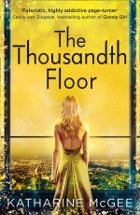The thousandth floor by Katharine McGee

HarperCollins, 2016. ISBN 9780008179977
(Age: 15+) Romance/Speculative. In every sense, this futuristic
birds-eye view of entitled adolescence seems plausibly speculative.
We can imagine that in the twenty-second century most of New York's
population could inhabit a single, mile-high building complex,
traversed by hovercraft. The futuristic hierarchy is not only
structural but financial - bottom dwellers are outclassed by McGee's
genetically engineered teenagers and their families on the uppermost
floors. However, sex, drugs, rivalry and school are still very much
on the menu for all social classes. Little has changed.
McGee follows the cycling fortunes of romantic couples who are
acquainted mostly through school or friendships. Eris and Mariel,
Rylin and Cord, Leda and Atlas, Avery and Watt transcend social
media by simply 'eye flicking' to chat or meet up at school, parties
and bars. They each have separate problems: divorcing parents, being
orphaned, drugs, poverty, cybercrime, identity issues and not least
a taboo attraction; the last of which may warrant an M15+ rating.
Thankfully there is no homophobia a hundred years from now - that
doesn't appear to be a problem unless you count the irony of the
fateful climax.
The entire romance/sci fi mash-up is retold as a flashback after a
girl falls from the Tower on the first page. The interweaving of
events surrounding a group of empowered and affluent teenagers is
skilful but the addictive page-turning claim of Cecily von Ziegesar
(author of Gossip Girl) has more to do with Leda's plans to
unveil everyone's secrets in order to exact revenge on Avery and
Atlas, her step-brother. With so much unresolved, we are in store
for a sequel.
Deborah Robins